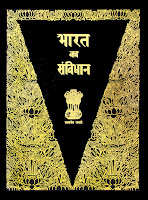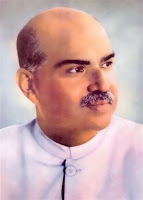Selected parts from Constituent Assembly Debates on Education during the making of the Constitution of India
Selected parts from Constituent Assembly Debates on Education during the making of the Constitution of India
|
Monday, the 6th December 1948 |
Shri Sarangdhar Das "I
must say here, that with the spread of western education in our schools and colleges
we had loss contact with the villages, and it was our leader, Mahatma
Gandhi,who advised the intelligentsia to go back to the villages, and that
was some thirty years ago. For the last thirty years we have been going into
the villages and making ourselves one with the villagers; and in reply to Dr.
Ambedkar's accusation, I would say that there is no localism in the villages.
There is ignorance,--yes, ignorance of the English language and also our
various written languages, and that situation is due to the kind of
Government we had, a Government that destroyed our educational system. As far
as knowledge of nature and wisdom gathered from Shastras and Puranas are concerned.
I would say that there is more wisdom and more knowledge in the villages than
in our modern cities. I am not a hater of cities. I have lived in cities in two
continents, but unfortunately our cities in India are entirely different from
the cities in other countries. Our people living in the cities are far
away from the villagers, from their life, and that is why we have become such
that we think there is nothing good in the villages." |
|
the 9th November, 1948 |
Shrimati Renuka Ray " I
would appeal to the House to include a proviso whereby a definite
proportion of the budget is allotted for this purpose. This is nothing very new; it is
already therein the Constitution of China which says: "Educational appropriations shall set apart not less than 15
per cent of the total amount of the
budget of the Central Government and not less than 30 per cent of the total amount of the provincial, district
and municipal budgets respectively." If we are to progress and prosper I suggest that in the matter of
the two nation-building services of education and public health there should
be some provision in the Constitution of the type that is there in the
Chinese Constitution" |
|
war and education |
Shri B. H. Khardekar "there
are two important fronts in life, first there is the war front, and then
there is the front of education. When we will have war, God alone knows;we
may have a major war at any time and we must be prepared for that. There is
some trouble in Kashmir; there was some in Hyderabad. We have got to be
prepared. It must also be remembered that we are a very poor country and we
must gather up all the resources that we have, so that we can attend to first things first. In a
country where democracy has to flourish, where democracy is in its infancy,
the front of education is the most important one. You know the appalling
condition of the people so far as education is the most important one. You know the appalling
condition of the people so far as education is concerned. About sixty to seventy years ago, in several, countries
free and compulsory primary education
was introduced. As a result of freedom, that should be our first business. Only yesterday, we discussed the necessity of having such a clause
in the Draft Constitution. In a
country like ours, even free compulsory primary education would not be enough, because the poor boy, who goes to
plough, forgets even to put his signature after a few years, and so, in proportion, even
secondary education for the backward communities, rather I may say for the poor would have to be provided. Sir, we are
an infant democracy and if we are
going to have really a democratic Government, we must have education. You know the great saying "Democracy
without education is hypocrisy without limitation" |
|
29th April, 1947 |
Sri V. C. Kesava Rao "education
is the birth-right of every citizen ".420 |
|
Friday, the 31st December 1948. |
Hindi for -qualification of Supreme court Judge Mr. Naziruddin Ahmad-"It could perhaps be safely assumed that, with the spread of
compulsory primary education, lawyers would be literate, and if one is not
literate, he cannot be a lawyer. To be a lawyer and also an Advocate, one has
to pass certain tests in literacy and commonsense. So that if one is not
literate he could not be an Advocate and so he could not be appointed a Judge
of a High Court and he could not also be appointed Judge of the Supreme
Court. |
|
8th December, 1948 |
"The Central Advisory Board of Education in their report on
postwar educational development in India, published in 1944, recommended
that the medium of instruction in the secondary stage should be the mother
tongue of the pupils." |
|
the 9th December, 1948 |
Prof. Shibban Lal Saksena (United
Provinces : General) "The Fundamental Rights Committee was appointed before the partition took place. In fact, these
rights were written in this form before the partition had taken place. The
minorities' rights were laid down on the basis that there will be no
partition. Yet, we have not changed them. I am not letting out a secret when
I say that our great leader Sardar Patel told us, "kindly do not
interfere with these rights, religious and cultural, because they form part
of an agreement arrived at before the partition." If anybody says that
these rights are not enough, I think it is the height of ungratefulness. I
think we have guaranteed rights which
our people will, probably, tell us in the future that we bartered away these rights. We have now
declared that no religious education shall
be given in the schools. Thirty crores of our people are Hindus; yet
they shall not have the right to be taught even the universal religious book,
the Gita, in the schools. Why have we done that? Because, at that time,
before the partition, it was thought that in view of the fact that there are
various religions, let it not be done. Now, when only three crores out of
thirty-three are the minority, still, the majority is denying itself the
opportunity of teaching the children the religious precepts of its community.
Yet, we have not changed these rights, because our leader has told us not to
interfere with them. I think the way in which the majority has tried to
accommodate the minority will be taken note of and it shall not be right for
anybody to come forward and loudly accuse the majority that it has not
provided sufficient safeguards. I think the real guarantee of the minority
is the good will of the majority. " |
Amendments in the Articles related to Education
from Draft Constitution to Constitution of
India till date
|
1948 |
Draft Constitution (CAD 23 Nov 1948) |
Art 36
|
Every
citizen is entitled to free primary education and the State shall endeavour
to provide, within a period of ten years from the commencement of this
Constitution, for free and compulsory education for all children until they
complete the age of fourteen years. |
|
1950 |
Constitution of India
1950
|
Art 45 |
“The State shall endeavour to provide, within a
period of ten years from the commencement of this Constitution, for free and
compulsory education for all children until they complete
the age of fourteen years”. |
|
|
Schedule 7 State List |
entry11 |
Education including universities subject to the
provisions of entries 63,64,65,and 66 of List I and entry 25 of List III |
|
1968 |
National Education Policy |
|
10+2+3 |
|
1975 |
ICDS ANGAWANWADI |
|
|
|
1975 |
NCR |
|
|
|
1976 |
42nd amendment Schedule 7 concurrent list |
entry 25 |
25. Education,
including technical education, medical education and
universities, subject to the provisions of Entries 63, 64, 65 and 66 of List
I; vocational and
technical training of labour. |
|
1986 |
National Education Policy |
|
|
|
1988 |
National Curriculum Framework |
|
|
|
2000 |
National Curriculum Framework |
|
|
|
2005 |
National Curriculum Framework |
|
Central Advisory Board of Education (CABE) |
|
2010 |
86 th amendment |
Article 21A |
The State shall provide free and compulsory education to
children between 6-14 years of age. |
|
2010 |
86 th amendment |
Article 45 |
The state shall endeavour to provide early childhood
education and care for all children upto 6 years of age. |
|
2010 |
86 th amendment |
Article 51A |
The State shall endeavour to provide early childhood care
and education for all children until they complete the age of six years." |
|
wef 1.4.2010 |
THE
RIGHT OF CHILDREN TO FREE AND COMPULSORY EDUCATION ACT, 2009 |
Section
2(c) |
“child” means a male or female child of the
age of six to fourteen years; |
|
2020 |
National Education Policy |
|
5+3+3+4 Currently, children in the age group of 3-6 are not covered in the 10+2 structure as Class 1 begins at age 6. In the new 5+3+3+4 structure, a strong base of Early Childhood Care and Education (ECCE) from age 3 is also included, which is aimed at promoting better overall learning, development, and well-being. |





Comments
Post a Comment